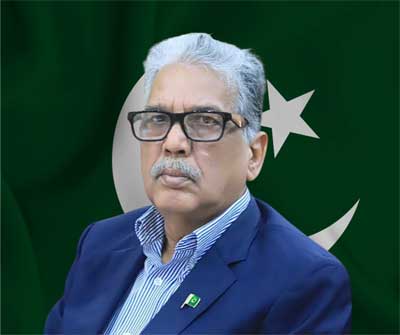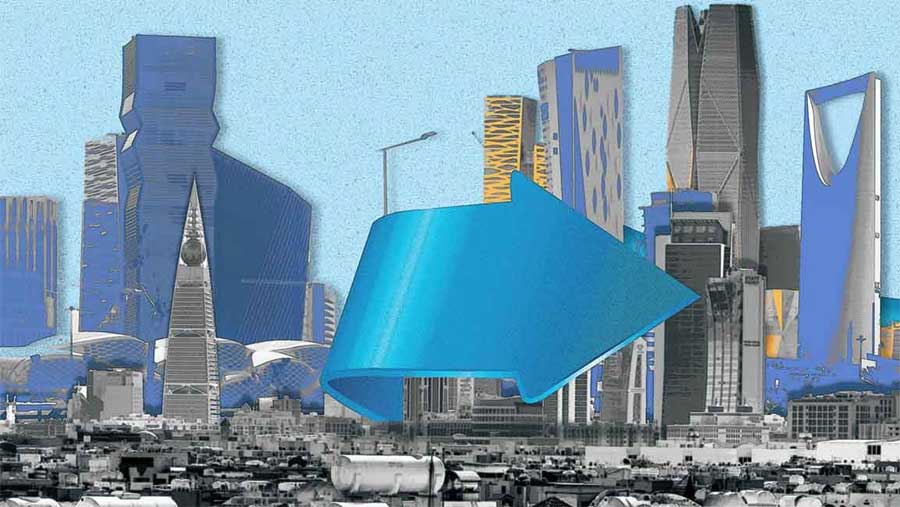

As Saudi Arabia marks eight years of Vision 2030, the Kingdom reflects on a transformative journey that has reshaped its economy, society, and global standing. Launched on April 25, 2016, under the leadership of Crown Prince Mohammed bin Salman, Vision 2030 is a bold and ambitious roadmap designed to reduce Saudi Arabia’s dependence on oil, diversify its economy, and develop public service sectors such as health, education, infrastructure, recreation, and tourism. Eight years into this visionary plan, the Kingdom has achieved remarkable milestones, setting the stage for a prosperous and sustainable future.
During my recent eight-day visit to Saudi Arabia’s capital, Riyadh, to meet my son, Abul Abbas Naqvi, who has been serving in the health sector there for the past eight months, I had the opportunity to witness firsthand the progress being made under Vision 2030. My son, deeply inspired by the vision initiated by King Salman and Crown Prince Mohammed bin Salman, shared valuable insights with me about how the transformation is unfolding.
From Oil to Innovation
Saudi Arabia, long recognized as an oil-dependent economy, has undertaken an ambitious and transformative journey under its Vision 2030 framework. Over the years, the Kingdom has witnessed a significant shift towards non-oil sectors, with a strong focus on technology, tourism, entertainment, and manufacturing.
One of the key drivers of this diversification is the rapid development of the digital economy. Investments in artificial intelligence (AI), cloud computing, and smart cities have positioned Saudi Arabia as a regional technology hub. The launch of NEOM, a $500 billion futuristic city, is a testament to the country’s commitment to innovation and sustainability. Additionally, initiatives such as the Saudi Data and Artificial Intelligence Authority (SDAIA) aim to integrate AI across multiple sectors, paving the way for a knowledge-based economy.
Moreover, the entertainment and tourism industries have witnessed unprecedented growth. The introduction of tourist visas, mega entertainment projects like Qiddiya, and international sporting events have enhanced Saudi Arabia’s global appeal. By 2030, the tourism sector is projected to contribute over 10% to GDP, compared to just 3% in previous years.
Saudi Arabia’s Non-Oil GDP Growth: A Game Changer for the Global Economy
Saudi Arabia’s economic reforms have yielded tangible results, with non-oil GDP reaching record highs. In 2023, the Kingdom’s non-oil GDP surged by 4.6%, underscoring the effectiveness of Vision 2030 in promoting sustainable economic development. This growth not only strengthens Saudi Arabia’s economic resilience but also plays a crucial role in stabilizing global markets.
The expansion of the non-oil sector has led to increased foreign direct investment (FDI), with key industries such as finance, logistics, and healthcare attracting significant interest. The Saudi government has introduced various policies to enhance the business climate, including regulatory reforms, streamlined licensing procedures, and incentives for foreign investors. As a result, multinational corporations are establishing regional headquarters in Riyadh, further integrating Saudi Arabia into the global economic landscape.
In addition, Saudi Arabia’s manufacturing sector is emerging as a powerhouse, with a focus on automotive, pharmaceuticals, and defense industries. The National Industrial Development and Logistics Program (NIDLP) aims to position the Kingdom as a global manufacturing hub, leveraging its strategic location to facilitate trade between Europe, Asia, and Africa.
The Rise of Saudi Startups: How Vision 2030 is Fueling Entrepreneurship
A thriving startup ecosystem is a crucial component of Saudi Arabia’s economic diversification strategy. Vision 2030 has fostered a dynamic entrepreneurial environment, providing funding, mentorship, and regulatory support to startups across various sectors.
The Saudi Venture Capital and Private Equity Association has played a pivotal role in boosting venture capital funding, with investments in Saudi startups reaching over $1 billion in 2023. The FinTech sector, in particular, has experienced rapid expansion, with companies such as STC Pay and Tamara revolutionizing digital payments and financial services. Similarly, the e-commerce industry has flourished, driven by rising internet penetration and consumer demand for online shopping platforms.
Government-backed incubators such as Monsha’at and KAUST Innovation Hub have provided critical support to early-stage startups, offering resources and funding opportunities. Additionally, initiatives like the Misk Foundation empower young entrepreneurs by equipping them with skills and knowledge to succeed in competitive markets.
Saudi Arabia’s commitment to fostering innovation is also evident in its support for research and development (R&D). The establishment of institutions such as King Abdullah University of Science and Technology (KAUST) has strengthened the country’s technological capabilities, leading to breakthroughs in biotechnology, renewable energy, and smart mobility.
Investment Boom: The Role of Public Investment Fund (PIF) in Saudi Arabia’s Future
The Public Investment Fund (PIF) has emerged as a key driver of Saudi Arabia’s economic transformation. With assets exceeding $700 billion, PIF has played a central role in financing mega projects, supporting strategic industries, and attracting global investors.
One of PIF’s most notable contributions is its investment in giga-projects such as NEOM, the Red Sea Project, and Amaala, all of which aim to redefine luxury tourism and sustainable urban living. These projects not only boost economic diversification but also create thousands of jobs, contributing to long-term economic stability.
PIF has also made significant investments in global technology firms, including stakes in Tesla, Uber, and SoftBank’s Vision Fund. By leveraging these investments, Saudi Arabia is positioning itself as a major player in the global technology landscape.
Additionally, PIF’s efforts in renewable energy are in line with Saudi Arabia’s goal of achieving net-zero emissions by 2060. The fund has invested heavily in green hydrogen, solar power, and wind energy projects, reinforcing the Kingdom’s commitment to sustainability.
Saudi Arabia’s Vision 2030 has successfully set the country on a path of economic diversification and transformation. By reducing reliance on oil and fostering innovation across multiple industries, the Kingdom has positioned itself as a dynamic and competitive economy. The rise of non-oil GDP, the flourishing startup ecosystem, and strategic investments by the Public Investment Fund all contribute to a promising future for Saudi Arabia and the global economy. As Vision 2030 continues to unfold, Saudi Arabia’s economic transformation serves as a model for other resource-dependent nations seeking sustainable growth.




